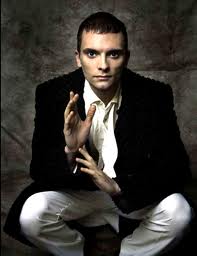Birmingham Symphony Hall, 19 March 2014
Never a dull moment it seems for Cameron Carpenter. His Birmingham concert very nearly did not happen at all, given the problems with his travel from Berlin to Birmingham, and the programme actually presented to us was very different from that planned.
In earlier days an organist had to do all the technical work for themselves, or rely on assistants to pull stops for them. Today, everything can be pre-set but this takes an enormous amount of time. In the event, Cameron Carpenter only had time before the start of the concert to set up about half of the planned items, and, as he admitted, no actually time to rehearse on an instrument he had never played before. Under the circumstances the outcome was impressive, even if at times a little alarming.
Having heard him live before, I was open to an approach to registration which was unique to the point of confusion. This he demonstrated from the start with an arrangement of Mozart’s piano sonata K284. The notes may have been Mozart but the sound produced was nothing like it. Wild changes of registration and dynamic, often within a single bar, immersed us in a musical maelstrom. The third movement, a theme and variations, lent itself to this approach and was more pleasing.
By contrast the Bach Trio Sonata which followed seemed almost mild with some fine solo stops in the slow movement and a bold Germanic edge for the finale.
He dropped the planned 1st sonata by Demessieux but gave us the fiercely aggressive 6th. This seemed to admirably suite his approach and his technical finesse. The flying pedal writing made his diamanté heels flash at the same time as light bounced off his sparkling shoulders. He then added a Chopin Etude in the same key, C#minor, but, like the Mozart, this seemed strained and unconvincing.
Marcel Dupre’s Variations on a Noel brought the first half to a close and proved to be the most satisfying work of the first half. He brought a Gothic temperament to his interpretation and a range of tonality and texture which was totally convincing. The macabre elements in the music are there, though we rarely hear them as exposed as on this occasion.
After the interval we were in the lap of the gods as there had been no time to prepare anything except for the Scriabin. He opened with Bach, which impressed with the subtly of its registrational changes. To the ear this could have been fine organo pleno but watching the console there was continuous minor changes which added nuances to the phrasing throughout. The fugue built from a whisper to a triumphal climax drawing on the full reeds and en chamade trumpet.
He then improvised three short pieces, which proved to be unexpectedly lyrical and jazz based in their use of gentle syncopation. The final movement was played by the left hand alone, though the sound made this difficult to believe.
Scriabin’s 4th sonata is a moody, restless piece which assumes the sustaining power of the pian o rather than the consistency of the organ. The hazy opening, with solo voices disappearing into the distance, was very well structured and the changes in colour all apt.
An encore was called for, and it was no surprise when he played an arrangement of a movement from one of Bach’s cello suites for pedal alone. It was masterly.
He can be heard again in London at the RFH on Saturday 29 March, assuming he is able to get there!

